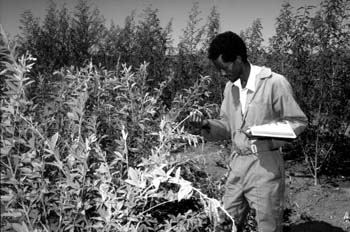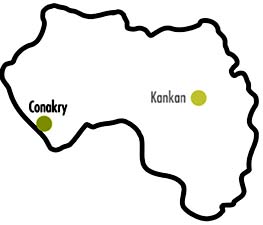
KEY FACTS
Population: 9.5 million
GDP per capita: US$ 410
Population below poverty line: 52%
Labour force by occupation: Agriculture 80%; industry and service 20%.
Total land area: 245 857 sq km, bordering the North Atlantic Ocean, Guinea-Bissau, Sierra Leone, Senegal, Mali, Côte d’Ivoire and Liberia.
Total arable land: 3.63%
Life expectancy: male: 48 years; female: 51 years
Literacy rate: male: 50%; female: 22%
Human Development Index: 156/177
(Source: UN; World Bank; CIA Factbook)

FAO IN GUINEA
In a bid to improve coping mechanisms and food security among 10 000 returnee households from Côte d’Ivoire, Sierra Leonean refugees and host communities, FAO undertook the provision of agricultural inputs and technical assistance in Guinea Forestiere. School vegetable gardens received seeds and tools, which increased the self-reliance of school feeding programmes. A small number of income-generating projects helped a total of 20 000 IDPs, returnees and host communities to increase their food security and coping mechanisms in general.
Background
In Guinea, economic problems combined with instability among its neighbours and questions regarding upcoming elections have created a sense of uncertainty. As a result, the country is experiencing a state of high inflation and the breakdown of social infrastructure and services. Guinea has been hosting almost one million refugees for over ten years as a result of conflict in the Mano River Union countries. Furthermore, the country is coping with internal displacement following rebel attacks in 2000-2001 and more recently with additional refugees and returnees from the 2002 conflict in Côte d’Ivoire.
The humanitarian situation continues on a downward trend, with increasing levels of vulnerability, malnutrition, morbidity, and mortality rates. Presently, up to 52 percent of the population lives below poverty level as opposed to 40 percent in 1996. Shortages of foreign currency, inequalities in wealth distribution and stagnating wages worsen an already critical situation. The breakdown in transportation and telecommunication services as well as intermittent water and power cuts add to widespread dissatisfaction and tension.
In 2005, Guinea recorded a series of natural disasters, not least the locust invasion, which affected the Sahel region. Another disaster testing the resolve of the Government is the demand for more arable land in Guinea Forestiere, which has led to the deforestation of more than 200 000 hectares of land for shelter, firewood and agriculture.
Needs analysis: Food security and agriculture sectors
The deterioration in the socio-economic situation in Guinea has had serious effects on the population’s food security, particularly in rural areas. Moreover, the reduction in the international donors’ financial assistance to Guinea and the fall in export income have seriously limited government capacity to invest in priority areas like agriculture. In spite of a slight increase in national food production, accessibility to adequate quality food remains a problem as a result of low household purchasing power and limited access to arable land. Almost 90 percent of the people suffering from hunger and malnutrition live in rural areas, while 36 percent of households are confronted with malnutrition. Over the last three years, rice production stagnated at approximately 800 000 metric tonnes, a quantity that does not adequately meet community consumption. The limited financial capabilities of most households seriously impede their access to agricultural inputs and equipment, particularly due to a lack of agricultural financial institutions.
FAO intends to pursue building the agricultural production capacity of crisis-affected households through the supply of food and vegetable seeds and farming implements. Poor agricultural yields and limited self-sufficiency of households will receive significant support through the provision of these elements. Together with technical guidance, this strategy will enhance intensive production while also developing marginal land. Furthermore, promoting school gardens in areas already receiving World Food Programme assistance and targeted as vulnerable will strengthen the already significant impact of food aid.
One of the challenges in the struggle against food insecurity will consist not only in bolstering vulnerable group food production capacities, but also in rehabilitating the vegetal cover, restoring soil fertility in old campsites and refugee-damaged areas and protecting arable lands. This will contribute to environmental protection and lead to the reintroduction of cash crops, income generation, and the improvement of the living conditions of the populations in the immediate surroundings of the refugee camps. Particular emphasis will be placed on assisting host communities who have shared their resources with refugees for over a decade and more recently with returnees.
Regarding locust control, the alert system needs to be revitalized and enhanced in cooperation with neighboring Sahelian countries.
PROPOSALS
FAO RELIEF AND REHABILITATION ASSISTANCE
Funding
required: US$ 3 170 000
|
Emergency agricultural assistance to Liberian refugees having decided to settle in Guinea at the end of the official repatriation process |
Issues addressed: Food insecurity, lack of livelihood options for Liberian refugees in Guinea.
Objectives: Improving production capacity and food security of refugees.
Beneficiaries: 5 000 refugee households with access to land in the immediate surroundings of camps located in the prefecture of N’Zérékoré, Macenta and Lola.
Activities: Strengthening agricultural production capacities through the provision of quality seeds (rice, maize, market gardening) and essential farming inputs.
Implementing partners: Ministry of Agriculture and Animal Husbandry, UNHCR, WFP, and various local and international NGOs.
Duration: January 2006 - December 2006.
Funds requested: US$ 500 000.
|
Emergency agricultural assistance to host households living in the immediate surroundings of refugee camps in Guinée Forestière |
Issues addressed: Host families living in the vicinity of refugee camps are suffering from an increased pressure on natural resources and their livelihoods are threatened.
Objectives: Contribute to the fight against food insecurity and poverty among host families. Promote income-generating activities and build up agricultural production capacities of beneficiary households.
Activities: Supply rice, maize, market garden seeds and essential farming tools. Technical advice and basic training are also envisaged.
Beneficiaries: 5 000 host families living in the immediate surroundings of refugee camps in the prefectures of N’Zérékoré, Macenta and Lola.
Implementing partners: Ministry of Agriculture and Animal Husbandry, UNHCR, WFP, local and international NGOs.
Duration: January 2006 - December 2006.
Funds requested: US$ 500 000.
|
Emergency agricultural assistance to facilitate the reintegration of demobilized and unemployed young volunteers in Guinée Forestière |
Issues addressed: Guinea Forestière hosts nearly 5 000 demobilized youths spread over the Kissidougou, Gueckédou, Macenta, N’Zérékoré, Lola, Yomou and Beyla prefectures, all in need of securing their livelihoods.
Objectives: Urge demobilized and unemployed youths to engage in farming. Contribute to poverty alleviation. Build up the beneficiaries’ production capacities. Contribute to the fight against food insecurity. Promote income-generating activities.
Activities: Supply beneficiaries with quality rice, maize, market garden seeds and essential farming tools. Technical support and training are also part of the programme.
Beneficiaries: 5 000 families of unemployed demobilized youths with access to land.
Implementing partners: Ministry of Agriculture and Animal Husbandry, Ministry of Youth, WFP, UNHCR, UNICEF, local and international NGOs.
Duration: January 2006 - December 2006.
Funds requested: US$ 450 000.
|
Rehabilitation of former refugee camp sites and their surroundings damaged as a result of the protracted refuge presence |
Issues addressed: To cover their basic firewood and shelter requirements, refugees from Liberia and Sierra Leone have resorted to an inordinate use of natural resources, causing a gradual destruction of the vegetal cover of the areas concerned.
Objectives: The restoration of damaged forest areas.
Beneficiaries: People depending' on 100 hectares of damaged areas in and around the camps in the prefectures of N’Zérékoré (Kola camp), Macenta (Kouankan camp) and Lola (Laîné camp).
Activities: Provision and multiplication of forest seedlings. Replanting of damaged areas. Environmental education and training of beneficiaries.
Implementing partners: Ministry of the Environment, Ministry of Agriculture and Animal Husbandry, UNHCR, WFP and local and international NGOs.
Duration: January 2006 - December 2006.
Funds requested: US$ 375 000.
|
Support to school gardening in 50 schools benefiting from WFP assistance through its School Feeding Programme |
Issues addressed: Schools can provide an opportunity to improve the know-how of both students and parents in terms of farming practices and proper nutrition.
Objectives: Contribute to improving the diet of children in WFP canteens. Strengthen the agricultural capabilities of parents. Promote income-generating activities.
Activities: Seed varieties will be selected and distributed through the help of local NGOs, who in cooperation with the Ministry of Education will mobilize and sensitize the targeted students and schools.
Beneficiaries: 50 schools, as well as cooperatives, Students’ Parents and Friends of the School Associations.
Implementing partners: Ministry of Agriculture and Animal Husbandry, Ministry of Pre-University Education, WFP, UNICEF, UNHCR and various local and international NGOs.
Duration: January 2006 - December 2006.
Funds requested: US$ 470 000.
|
Creating an information and data collection unit on food security |
Issues addressed: Various stakeholders need technical assistance, enhanced coordination and accurate information to support rural households in securing their food security.
Objectives: Coordinate the activities of various stakeholders in the field of food security in Guinea Forestière. Provide technical assistance to the different Ministries dealing with food security.
Activities: Create a unit to assist ministries, local authorities and NGOs in data collection on food security,
Beneficiaries: Ministry of Agriculture, Animal Husbandry and Forestry, Ministry of the Environment, Ministry of Fisheries and Aquaculture, the UN agencies, local and international NGOs.
Implementing partners: Ministry of Agriculture, Animal Husbandry and Forestry, Ministry of the Environment, Ministry of Fisheries and Water Resources, UN Agencies, local and international NGOs.
Duration: January 2006 - December 2006.
Funds requested: US$ 400 000.
|
Building a national capacity for locust control in Guinea |
Issues addressed: Risk of desert locust invasion to crops and vegetation.
Objectives: Reinforcing preparedness in locust control and follow-up of locust control activities at the sub-regional level.
Activities: Strengthen the locust control and plant protection capacities and make it possible for concerned managers to participate more actively in sub-regional forums where all aspects relating to locust invasions are addressed.
Beneficiaries: Ministry of Agriculture, Animal Husbandry and Forestry, Ministry of the Environment, UN Agencies, local and international NGOs.
Implementing Partners: Ministry of Agriculture, Animal Husbandry and Forestry, Ministry of the Environment, UN agencies, local and international NGOs.
Duration: January 2006 - December 2006.
Funds requested: US$ 475 000.